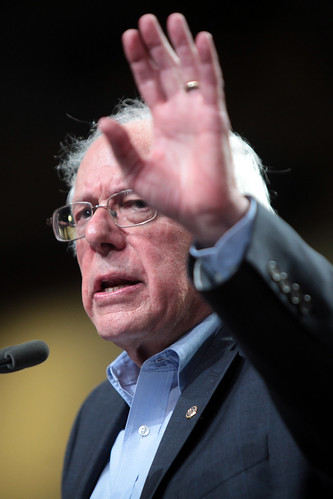Reprinted from Politico
Even as he leaves the stage after endorsing Hillary on Tuesday, Sanders has taught us the value of relentlessness.
Every aspect of Bernie Sanders' campaign has been remarkable -- he's rewritten the script. Raise money? $27 at a time, from millions of people. Knife your opponent where she's most vulnerable? "We don't care about the damned emails." Angry attack ads? Instead: Simon and Garfunkel singing "America."
But of all the odd and moving aspects of the Sanders run, none says quite as much about the man and his motives as how he's brought it to a close. Ever since it became clear he'd lost by a (wide) whisker against the great political machine of our age, all the various Washington authorities have been explaining to him that it's time to drop out, that he was squandering his credibility by not endorsing Hillary, that he was damaging his brand. Last week, House Democrats literally booed the guy, for daring to say, "The goal isn't to win elections, the goal is to transform America."
To that audience, no greater heresy was possible: most of them have exactly one goal, which is to return yet again to their D.C. offices, or perhaps move up to the Senate. "Transforming America" ranks on their priorities slightly below "flap my arms and fly."
But Sanders actually did mean it. And to a significant degree he has done it -- the platform hammered out over the weekend in Orlando, Florida, is, as he has said, the most progressive of any major party ever, and by a lot. His relentless focus on the issues has meant that the Democratic Party, anyway, has begun to transform itself.
On Tuesday, Sanders is expected to officially endorse Hillary Clinton (having long since made it clear he would vote for her). As he leaves the stage, many Democratic insiders may hope to forget about him. A few of his most fevered backers may even boo him, sad that he won't run an independent candidacy for president. But I imagine it won't make much more difference to his mood than the anger of the people in Congress who booed him. Of course he's going to back her, and of course he's going to struggle to keep reforming the Democratic Party so it can elect the kind of people he's brought to politics this past year; if we can't do those things, the platform will be a dead letter.
Which of course it could be in any event. Nothing in the platform guarantees success -- Clinton could decide to ignore the promises her team made. It will be up to the movement to enforce these promises -- but we're good at doing that, in no small part thanks to the lessons in relentlessness we've learned from Bernie. If she backslides once in office, the words of her platform will be printed on every sign and banner we carry for the next four years.
Sanders' entire campaign, in fact, has been an extended lecture on how a campaign should in fact be about transformation: how you need to get money and corporate power out of politics to make it happen, how you need to make sure everyone can go to college and no one spends their life working for so little money they can't engage as a citizen.
And because he meant it, he was able to do it. His insistence on continuing to push his message meant that when the Democrats met this weekend to wrap up the platform, he still had real leverage. Not enough to completely win every fight--team Hillary was not ready, once and for all, to drive a stake through the Trans-Pacific Partnership trade agreement (though I think he's made it so toxic that if we keep organizing it will be hard to pass, even in a lame-duck Congress). But enough to produce a platform far far more powerful than most of us ever expected.
Take energy and climate, the area that I helped draft. Two weeks ago in St. Louis, we lost most of the crucial votes by a single vote: carbon pricing, a climate test for future federal action, and so on. This weekend in Orlando, we won most of those points and more. Where four years ago the Democratic platform called for an "all-of-the-above" energy strategy, and where the Obama administration focused on fracked gas, the new platform explicitly ranks solar and wind above natural gas as we build new power plants. It explicitly invokes--not once but twice -- the exact words President Barack Obama used to reject the Keystone pipeline, that it would "significantly exacerbate" climate change. That is now the test for all federal policy and projects. The platform acknowledges for the first time what almost every economist has said for decades: Carbon and methane should carry a price to reflect the damage they're doing to the planet.
We didn't win every vote: A total ban on fracking was defeated. But Josh Fox, a great stalwart of the anti-fracking movement, followed up that loss by introducing the grand "unity measure" on energy: He described weeping as he read the first draft of it in the backrooms of the convention center where we were meeting. Among other things, it promises landowners, communities of color and tribal nations a seat at the table going forward and since these are three of the groups that have led the climate justice battle, that's an important concession.
We who stood behind Bernie know how to be steadfast and unruffled, even when the powers that be are begging us to stop. One of the reasons we know is because Sanders has shown us. He campaigned under the lovely slogan #NotMeUs, and the Us have learned a lot about hanging together and making the message stick.






